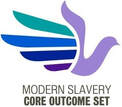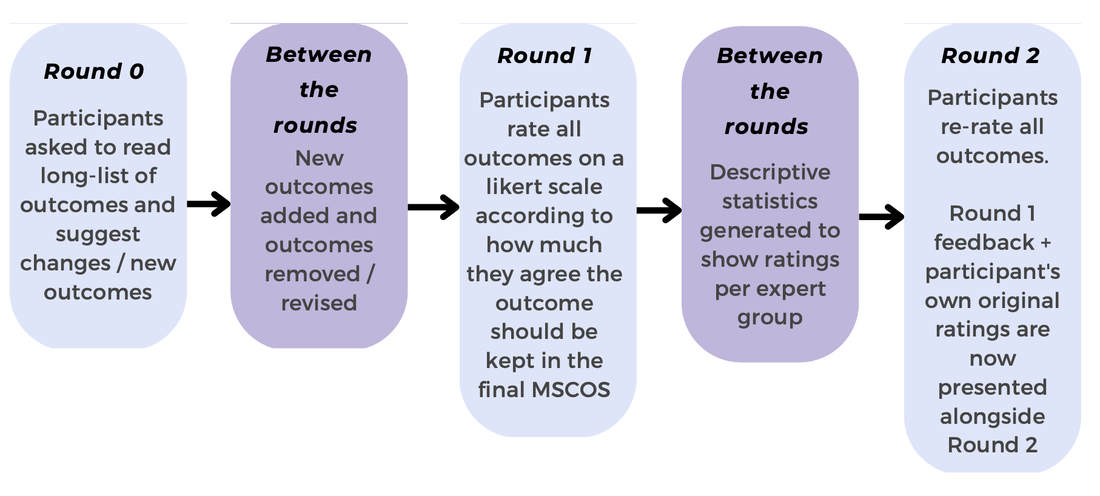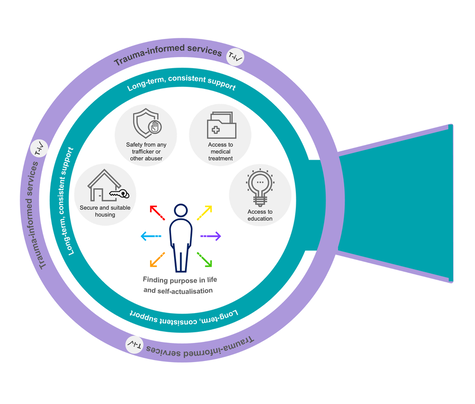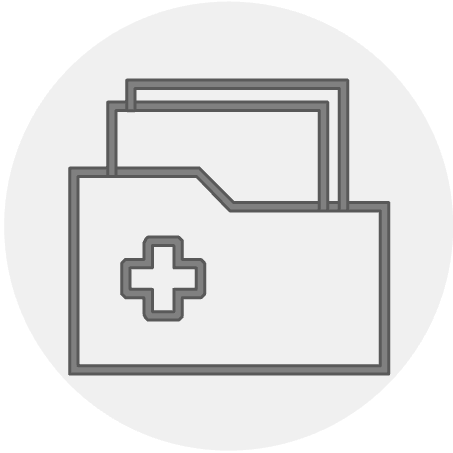WHAT IS AN E-DELPHI STUDY?
Delphi is a method which involves multiple rounds of questionnaires, and is designed for reaching agreement on a topic of choice. Here, we will hold it online, making it an e-Delphi study. A Delphi study usually involves multiple rounds, which allows for participants to see feedback in between rounds in the form of the anonymous answers of other participants. This allows participants to change their mind if they wish and for consensus to eventually be reached. The advantage of Delphi is that it is an interactive process; in this sense, it allows participants to review other opinions as well as review their own, allowing for more converging agreement over time as the panellists are in essence working together to make their decisions.
Overview of the E-Delphi method
E-DELPHI ROUND 0
For Round Zero of the E-Delphi we asked experts (comprising of academics, survivors, practitioners and policymakers) to review a longlist of 'outcomes' that our research identified as important for survivor healing and reintegration. We grouped related outcomes and provided a detailed description of each outcome. Experts reflected on changes that might need to be made to the outcomes and if there were any outcomes missing from our list. We had a monumental response, with 53 people participating in Round 0, including 36 survivors. We read through every comment and discussed our response to multiple times. You can find a document detailing our response to people's comments here and a final list of amended outcomes for Round 1 voting here.
E-DELPHI ROUND 1
We ranked outcomes according to survey responses, responses for the top 5 outcomes and domains, and participant comments. We used this to narrow down our outcomes list and help determine the core outcome set. Anything under the middle-ranked outcome was considered for removal, with those in the bottom quarter especially at risk. We merged or removed outcomes if they were part of an unpopular domain or if there were several negative comments about the outcome. We saved the outcome if it had received at least three top 5 votes. After this process, we were left with 34 outcomes from an original list of 72. We also merged the two least popular domains, ‘creating change’ and ‘agency purpose’, based on participants’ your comments and the fact that very few outcomes remained in these after the removal and merging process. We, therefore, also reduced the number of domains from 10 to 9. You can see a full summary of this process in this our summary document here.
E-DELPHI ROUND 2
We had our best survey response with 76 people participating, up from 64 in Round 1 and 53 in Round 0. We asked participants to read each of our 34 outcomes and choose from strongly disagree, disagree, neither agree nor disagree, agree, strongly agree according to whether they agreed that this outcome should be included in the final core outcome set. The outcomes were incredibly difficult to rate, with most people (81%) choosing ‘strongly agree’ or ‘agree.’ We assigned a score for each option selected giving 2 for strongly agree, 1 for agree, 0 for neither agree nor disagree, -1 for disagree, and –2 for strongly disagree. We then added up these scores and ranked all the outcomes. The top 12 outcomes were chosen to go to the final consensus workshop. You can see a full summary of this process in this our summary document here.
THANK YOU
We are really grateful for the expert input of many organisations, survivors, policymakers and researchers to the E-Delphi study. We'd like to recognise the kind efforts of our project partners, the Survivor Alliance and Helen Bamber Foundation. We'd also like to acknowledge the input of Survivor Exit Foundation in South Africa, who have been crucial in providing the study a more international perspective, and extend our thanks to Professor Patricia Hynes at Sheffield Hallam University as well as Finia Kuhlmann for their input and advice.
MSCOS Discussion Forums
|
PARTNERS
|
FUNDER
|
















